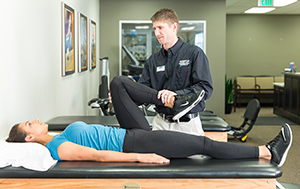Increasing Your Knee’s Range of Motion
Swelling, tight or weak muscles, or scar tissue may make it hard to move your knee. Work with your physical therapist to increase your knee’s range of motion. You may have some of the treatments below to help.
 |
| Passive range-of-motion exercises help increase your knee’s mobility. |
-
Thermal ultrasound. Sound waves are used to warm up knee tissues. This improves blood flow and can speed up tissue healing.
-
Moving your kneecap (patella mobilization). This is done by you or your physical therapist. It prevents the buildup of scar tissue and improves range of motion.
-
Bracing or taping. These are often used to correct a problem with patellar tracking. They also let your muscles work more. And they give you a sense of stability when you have weakness or pain.
-
Passive range-of-motion exercises. These gently bend and straighten your knee joint. Your leg is moved by your physical therapist or a machine.
-
Assisted range-of-motion exercises. These also move your knee. You use your own strength. Your physical therapist or a machine will help you.
-
Active range-of-motion exercises. These are done by bending and straightening your knees under your own power.
Online Medical Reviewer:
Elizabeth Oswald PT DPT
Online Medical Reviewer:
Marianne Fraser MSN RN
Online Medical Reviewer:
Trina Bellendir PT
Date Last Reviewed:
2/1/2024
© 2000-2025 The StayWell Company, LLC. All rights reserved. This information is not intended as a substitute for professional medical care. Always follow your healthcare professional's instructions.